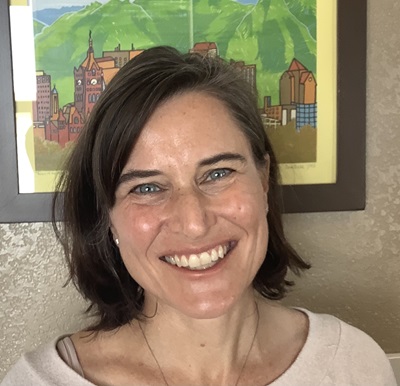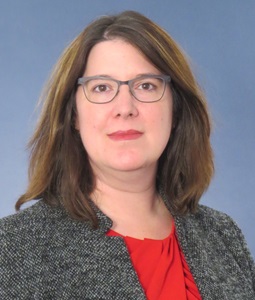Investigator Spotlight
5 Questions for Researchers

Mandy A. Allison, MEd, MD, MSPH
Associate Professor of Pediatrics, University of Colorado School of Medicine
Co-Director, Prevention Research Center for Family and Child Health (PRC)
ACCORDS Investigator
Dr. Mandy Allison is an Associate Professor in the Department of Pediatrics at the University of Colorado. Before medical school, she taught public school in Mississippi where she saw the effect of poor health on her students which led to her focus on pediatrics and preventive care. She currently sees patients and teaches residents and students at the Child Health Clinic at Children’s Hospital Colorado, serving a racially, culturally, and linguistically diverse, mainly low-income population.
She has conducted immunization delivery, school health, and early childhood development research that has been funded by the NIH, CDC, AHRQ, and foundations. She joined the team at the Prevention Research Center for Child and Family Health (PRC) in 2016 and has lead their research about serving mothers with previous live births and mothers with substance use disorder with Nurse-Family Partnership (NFP). Since June 2019, she has been the Co-Director of the PRC with Dr. David Olds, the founder of NFP.
1. Why is your area of science important?
Now, more than ever, interventions to stop the cycle of poverty, structural inequality, and poor health are desperately needed. Community-based interventions, such as Nurse-Family Partnership (NFP), that empower young families to improve parental health, provide competent care for children, and improve economic self-sufficiency are one component of systemic changes that are needed to stop the cycle and reduce health disparities. Community-based programs that are tailored to the communities and families they serve by ensuring meaningful community and family engagement are particularly well-positioned to address inequities that are built into the existing health care system.
2. What was important in your Health Services Research training?
Two very important lessons from my HSR training are: 1) Taking time to refine and clarify your research question(s) pays off because a quality research question drives development of a quality study design that will provide meaningful results. 2) I learned to ask myself hard questions about the ‘so what’ of my research so that my research has implications for policy and practice.
3. What are the major take home messages your current research provides?
NFP, which has previously been implemented only among first time mothers (except for in Tribal communities), requires adaptations to meet the needs of mothers with previous live births. With these adaptations, NFP appears to be a promising intervention for improving health and life course outcomes for mothers with previous live births who are facing adversity due to poverty and structural inequity; however, additional studies with quasi-experimental and experimental designs are needed to determine effectiveness and drive policy decisions. The relationship between the nurse and the mother and using a trauma-informed approach are critical elements in the effectiveness of the NFP intervention.
4. What are your goals or areas for future research?
Our next step for research related to NFP for mothers with previous live births is conduct a randomized clinical trial. We’re resubmitting an R01 in July and hope we’ll get funded this round. An area for future research that is more aspirational right now is to conduct a series of studies to determine the effectiveness and cost-effectiveness of a transformed model of pediatric primary care where the majority of preventive care is provided through community-based programs such as NFP.
5.What advice do you have for researchers who want to work in this area? OR What is the most important advice you have received from your mentors?
Listen to your target study population and take their message seriously but don’t take yourself too seriously.

Susan Moore, PhD, MSPH
Director, ACCORDS mHealth Core & Informatics Core
Associate Director, mHealth Impact Lab, Colorado School of Public Health Research
Assistant Professor, Community and Behavioral Health, Colorado School of Public Health
Research Assistant Professor of Medicine, General Internal Medicine University of Colorado School of Medicine
Dr. Moore received her BS in biological sciences from the University of New Orleans, her MSPH from the Colorado School of Public Health, and completed her doctorate in health and behavioral sciences at the University of Colorado Denver. Prior to her research career, Dr. Moore worked in information technology (IT) for ten years, focusing primarily on implementation and support for software systems and technical education, training, and evaluation. Her ongoing research interests include consumer health informatics, digital health innovation, interoperability and clinical decision support, and the use of mobile and digital health technology to deliver patient-centered care.
1. Why is your area of science important?
When it comes to mobile and digital health, the potential impact on health and health care is immense. Consider just a few facts:
- Broadly speaking, according to the FDA, digital health encompasses mobile health, health involving wearable devices, telehealth and telemedicine, health information technology, and personalized medicine. The potential scope of impact on health and healthcare is tremendous.
- When considering mobile health alone separate from the other areas of digital health, five billion people worldwide use a mobile phone. Of those, 3.5 billion use smartphones. In America alone, 97% of adults – over 200 million people – use mobile phones, and 85% of them (178 million) use smartphones. (Source: Pew Research Center)
- As of 2018, 75% of adults reported relying on technology for some kind of health management purpose. (Accenture, 2018)
- This area of science is not only important but is absolutely critical given the increasing digitization of health care across all clinical conditions. The more we can learn, the better we can do for all patients, everywhere.
2. What was important in your Health Services Research training?
My formal health research-focused training was in public health (masters’ level) and health and behavioral sciences (doctoral level). This prepared me to not only think about upstream considerations that inform health care and health services delivery from a prevention perspective, but also about behavior change in the context of patient and provider engagement with and adoption of technology-focused solutions.
3. What are the major take home messages your current research provides?
First, context matters. Design matters. Workflow matters. I’ve said it before and I’ll say it again – the best solution in the world won’t be successful if no one uses it. When it comes to my current research, we are seeing that confirmed from both patient and provider perspectives. Researchers in this field should take the necessary time to plan for user acceptance testing and should also include an implementation science aspect in their projects. A recent example of this was from an R21 that we just finished, which used both text messaging and in-app messaging with patients to collect weight information and responses to patient-reported outcome measure surveys respectively. What we found was that the extra burden imposed by using an in-app messaging feature to collect data it wasn’t designed for stood in the way of patients being able to share that information: 60% of people attempted, with an average response rate of 47%. In contrast, 72% of people successfully shared their information via text.
From a patient perspective, another critical message is on the importance of including diverse groups in research in this field. There is a misperception that patients from traditionally medically underserved or otherwise disadvantaged communities have no interest in using technology, or that they’re not able to use technology. Not only is that not true in general, it’s even less true when it comes to mobile health. The evidence base about the utility of text messaging in reaching and engaging with people in these communities is well established, and with the increasing ubiquitousness of smartphone technology, more evidence about the suitability of other mobile health solutions is becoming apparent.
Finally, from a provider perspective, we are seeing increasing concern about being overburdened with data, especially patient generated health data. Providers are worried about data volume, data quality, and about being expected to be responsible for actively monitoring everything that’s going on with a patient around the clock through digital health devices and solutions. Figuring out how to be responsive to these very real needs and concerns is essential.
4. What are your goals or areas for future research?
I’m particularly interested in continuing to explore the collection and integration of patient generated health data for health promotion, disease prevention, and clinical care. I’m also doing more with the use of wearable devices for sensor-based data collection.
5. What advice do you have for researchers who want to work in this area?
This field is by nature very multidisciplinary. Researchers who want to work in mobile and digital health should be prepared to engage not only with clinical experts, but also with computer scientists, data scientists and biostatisticians (especially
those interested in novel methods and big data), information technology professionals including technical designers and architects, and implementation scientists. Of course, what that means is that there’s something in this field for everyone!